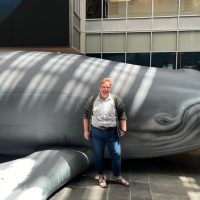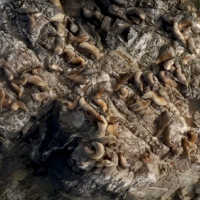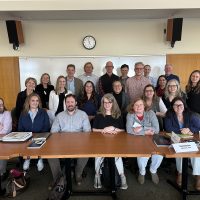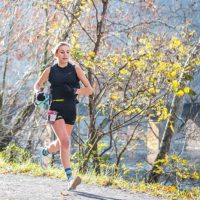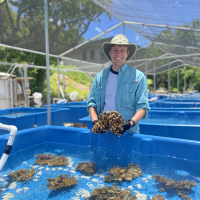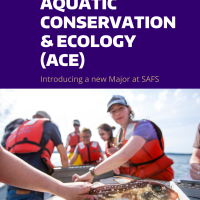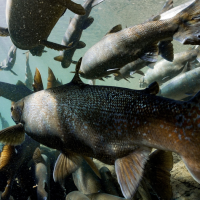Filter Results
Big Water Consulting Hiring Research Assistant/Intern
Big Water Consulting is pleased to offer a unique opportunity for an internship with a private, but public interest-oriented, consulting firm working on dynamic and evolving projects directly focused on enhancing the ability of tribal governments, housing authorities, and service providers use data to plan for the future and improve the communities they work for and in. One such project, the Northern Cheyenne Health and Housing Needs Assessment, is helping a tribe in rural Montana exercise its tribal data sovereignty by facilitating the tribe’s collection of data that accurately describes community conditions and preparation of reporting materials that will properly tell the community’s story and enable tribal leaders and program staff to plan for the future and attract the funding that their community needs.
Read moreZoe Rand, QERM PhD student, chosen as College of the Environment Graduate Dean’s Medalist
Zoe Rand is a recipient of this year’s College of the Environment Graduate Dean’s Medalist award, a PhD student in the Quantitative Ecology & Resource Management (QERM) Program and member of SAFS Professor Trevor Branch’s lab, using mathematical and statistical models to study the population dynamics of baleen whales.
Read moreNSF GRFP Info Session
Are you interested in applying to the NSF GRFP this fall? This five-year fellowship funds three years of your graduate education. Both undergraduate and graduate students can apply.
We are hosting an information session on the NSF GRFP to explain what it is, who is eligible for it, and a new structure for the workshop. We will also discuss the results of the most recent GRFP competition, and implications for future applicants.
Drones and machine learning help swimmers stay safe from sharks
Funded by the California Ocean Protection Council, SAFS Professor, Corey Garza, and colleagues at Stanford, UC Santa Cruz and the Middlebury Institute have embarked on a project to better understand shark and pinniped behavior off the California coast. They do this by tagging and tracking the animals, collecting background environmental data through buoys and mapping where pinnipeds gather. The goal is to understand how these variables interact and better predict when and where white sharks might be on the prowl — and, importantly, how to keep people out of the water when they are.
Read moreWDFW Hiring Two Freshwater Monitoring Technicians
The Washington Department of Fish & Wildlife is hiring two full-time, non-permanent Freshwater Monitoring Technicians.
The Freshwater Monitoring Technicians are responsible for collecting catch and angler effort data for salmon, steelhead, and other fish species in the Samish, Skagit, and Nooksack River basins (WDFW District 14) through interviews and drive-around counts. Working both independently and collaboratively, the technicians conduct biological sampling, gather field data, and engage with anglers to assess catch rates.
Educating judges on water resource science: Mark Scheuerell and Angela Dillon take part in a Judicial Education Workshop
In a time of increasing calls for Washington judges to adjudicate water conflicts that reflect the State’s growth and development, two members of the University of Washington School of Aquatic and Fishery Sciences attended the Judicial Education Workshop on Water Resource Science, held on March 28, 2025, at Washington State University (WSU). Angela Dillon, a PhD student at SAFS, gave the judges an overview of the importance of water for the environment and fish, with an emphasis on salmon and the Electron Dam on the Puyallup River, while SAFS Professor, Mark Scheuerell, gave a tour of Lower Granite Dam on the Snake River, held on March 29.
Read moreBalancing academics and athletics
While pursuing her PhD focused on quantitative blue whale population ecology, Kristina Randrup is also a competitive trail runner, emerging as one of the top trail runners in the nation. Check out a feature piece written about Kristina by the American Trail Running Association.
Read moreCorals, contaminants, and climate change
Bleaching. This complicated and foreboding term now lurks around every conversation about coral reefs. Impacted heavily by climate change and associated warming oceans, coral reefs experience bleaching when the algae that live in their tissues and contribute vitally to their growth are expelled, causing the corals to lose their color, and possibly their lives. Callum Backstrom, SAFS PhD student and one of UW’s 2025 Husky 100, is studying the resilience of certain corals to bleaching.
Read moreNew Major: BS in Aquatic Conservation & Ecology (ACE)
We’re excited to announce a new undergraduate degree in the School of Aquatic & Fishery Sciences (SAFS): Bachelor of Science in Aquatic Conservation and Ecology (ACE). Coming to UW in Autumn 2025.
The Aquatic Conservation and Ecology (ACE) degree is about the ecology of aquatic organisms, the rivers, lakes, and oceans in which they live, and how we conserve them for the benefit of people and the planet. This degree integrates the disciplines of ecology, evolution, and quantitative sciences and applies these principles to contemporary conservation and natural resource management issues.
Read moreScreening of Scale of Change, a salmon documentary
Join SAFS for the screening of a new documentary, Scale of Change, on 8 May at 6pm. The documentary explores how individual actions, no matter how small, can lead to monumental transformations for the Atlantic salmon.
Read more